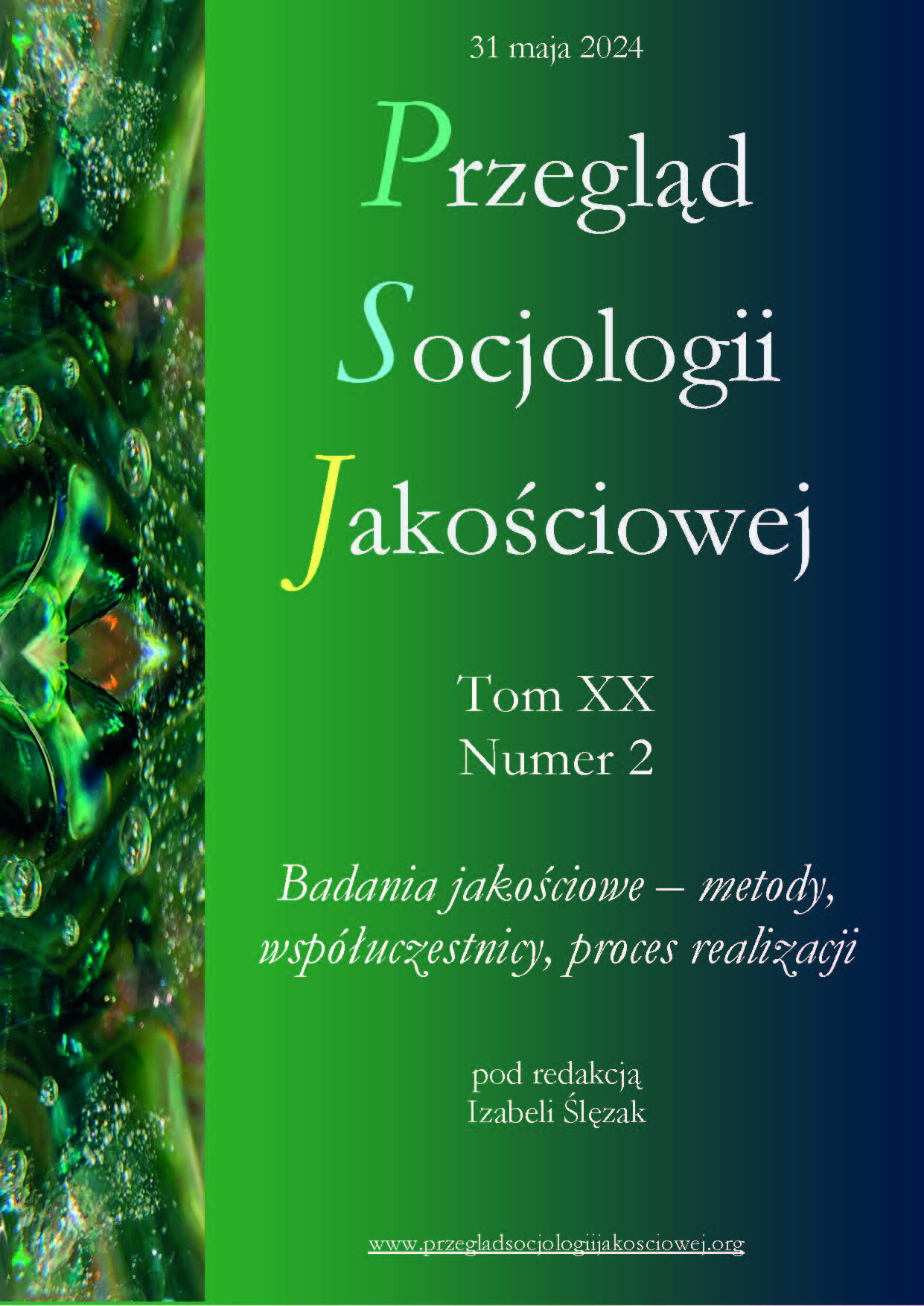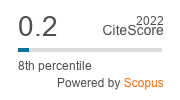Kontemplacja i podejścia pierwszoosobowe w badaniach społecznych
DOI:
https://doi.org/10.18778/1733-8069.20.2.02Słowa kluczowe:
badania kontemplacyjne, fenomenologia, wymiar patyczny, autoetnografia, emocje, medytacja, autoraportowanie, noty kontemplacyjneAbstrakt
Artykuł omawia koncepcje pierwszoosobowe w badaniach społecznych. Opisuje podejścia autoetnograficzne, fenomenologiczne i kontemplacyjne. To, co łączy te trzy podejścia, to refleksyjność, koncentracja na przeżyciach, procesie myślenia i odczuć ciała oraz na emocjonalnym i sytuacyjnym wymiarze poznawania świata, a w konsekwencji na badaczu jako na wytwórcy wiedzy. Można powiedzieć, że chociaż te podejścia różnią się, to łączy je cecha kontemplacyjności, w różnym nasileniu występująca w tych podejściach.
Miejsce uczestnika badania w sytuacji jego pracy naukowej poddane zostało eksplikacji we wszystkich trzech podejściach. Podkreślono aspekt ucieleśnienia w sytuacji i namysł nad subiektywnością i obiektywnością jako fikcyjnymi dystynkcjami obrazowania badań jakościowych. Przedstawiono także metody badań kontemplacyjnych.
Pobrania
Bibliografia
Bentz Valery M. (2016), Knowing as Being: Somatic Phenomenology as Contemplative Practice, [w:] V.M. Bentz, V. Giorgino (red.), Contemplative Social Research. Caring for Self, Being and Lifeworld, Santa Barbara: Fielding University Press, s. 50–79.
Google Scholar
Bentz Valery M., Marlatt James (2021), Deathworlds to lifeworlds: Collaboration with strangers for personal and ecological transformation, Berlin–Boston: De Gruyter.
Google Scholar
DOI: https://doi.org/10.1515/9783110691818
Berger Peter (1963), Invitation to Sociology: A Humanistic Perspective, Garden City: Doubleday.
Google Scholar
Berger Peter, Thomas Luckmann (1966), The Social Construction of Reality: A Treatise in the Sociology of Knowledge, Garden City: Anchor Books.
Google Scholar
Bochner Arthur P. (2020), Autoethnography as a Way of Life: Listening to Tinnitus Teach, „Journal of Autoethnography”, vol. 1(1), s. 81–92, https://doi.org/10.1525/joae.2020.1.1.81
Google Scholar
DOI: https://doi.org/10.1525/joae.2020.1.1.81
Bochner Arthur, Ellis Carolyn (2016), Evocative Autoethnography. Writing Lives and Telling Stories, New York: Routledge.
Google Scholar
DOI: https://doi.org/10.4324/9781315545417
Cooley Charles H. (1909), Social Organization: Study of Larger Mind, New York: Schocken.
Google Scholar
DOI: https://doi.org/10.1037/14788-000
Depraz Nathalie (2002), What About the Praxis of Reduction? Between Husserl and Merleau-Ponty, [w:] T. Toadvine, L. Embree (red.), Merleau-Ponty’s Reading of Husserl, Dorchester–Boston–London: Kluwer Academic Publishers, s. 115–126.
Google Scholar
DOI: https://doi.org/10.1007/978-94-015-9944-3_6
Dobosz Kala, Kacperczyk Anna, Kafar Marcin, Konecki Krzysztof T., Kroczak Hanna, Melnikov Andrii, Szczepaniak Colette, Szwabowski Oskar (2023), The Reverberations of War: Ukrainian and Polish Academics Write a Collective Autoethnography of Experiencing War in Ukraine, „Cultural Studies ↔ Critical Methodologies”, vol. 23(5), https://doi.org/10.1177/15327086231178013
Google Scholar
DOI: https://doi.org/10.1177/15327086231178013
Douglas Jack D., Johnson John M. (1977), Existential Sociology, Cambridge: Cambridge University Press.
Google Scholar
Ellis Carolyn (1991), Sociological Introspection and Emotional Experience, „Symbolic Interaction”, vol. 14(1), s. 23–50.
Google Scholar
DOI: https://doi.org/10.1525/si.1991.14.1.23
Ellis Carolyn (2001), With Mother/With Child. A True Story, „Qualitative Inquiry”, vol. 7(5), s. 598–616.
Google Scholar
DOI: https://doi.org/10.1177/107780040100700505
Ellis Carolyn, Bochner Arthur, Rambo Carol, Berry Keith, Shakespeare Hannah, Gingrich-Philbrook Craig, Adams Tony E., Rinehart Robert E., Bolen Derek M. (2018), Coming Unhinged: A Twice-Told Multivoiced Autoethnography, „Qualitative Inquiry”, vol. 24(2), s. 119–133, https://doi.org/10.1177/1077800416684874
Google Scholar
DOI: https://doi.org/10.1177/1077800416684874
Fontana Andrea, Van De Water Richard (1977), The existential thought of Jean-Paul Sartre and Maurice Merleau-Ponty, [w:] J. Douglas, J.M. Johnson (red.), Existential Sociology, Cambridge: Cambridge University Press, s. 100–129.
Google Scholar
Giorgino Vincenzo (2015), Contemplative Methods Meet Social Sciences: Back to Human Experience as It Is, „Journal for the Theory of Social Behaviour”, vol. 45(4), s. 461–483, https://doi.org/10.1111/jtsb.12078
Google Scholar
DOI: https://doi.org/10.1111/jtsb.12078
Giorgino Vincenzo (2016), Contemplative Knowledge and Social Sciences: Close Encounters of the Enactive Kind, [w:] V.M. Bentz, V. Giorgino (red.), Contemplative Social Research. Caring for Self, Being, and Lifeworld, Santa Barbara: Fielding University Press, s. 163–192.
Google Scholar
Hadot Pierre (1995), Philosophy as a Way of Life: Spiritual Exercises from Socrates to Foucault, Malden: Blackwell.
Google Scholar
Heidegger Martin (1962), Being and Time, New York: Harper & Row.
Google Scholar
Heidegger Martin (2000), Elucidations of Holderlin’s Poetry, New York: Humanity Books.
Google Scholar
Heinich Nathalie (2019), Sztuka jako wyzwanie dla socjologii, Gdańsk: Fundacja Terytoria Książki.
Google Scholar
Iyengar B.K.S. (1983), Light on Pranayama. Pranayama Dipika, London: Unwin Paperbacks.
Google Scholar
Iyengar B.K.S. (2002), The Tree of Yoga, Boston: Shambhala.
Google Scholar
Iyengar B.K.S. (2005a), Light on Life. The Yoga Journey to Wholeness, Inner Peace, and Ultimate Freedom, Pennsylvania: Rodale Books.
Google Scholar
Iyengar B.K.S. (2005b), The Illustrated Light on Yoga, New Delhi: HarperCollins Publishers India & The India Today Group.
Google Scholar
Janesick Valerie J. (2015), Contemplative Qualitative Inquiry: Practicing the Zen of Research, Walnut Creek: Left Coast Press.
Google Scholar
DOI: https://doi.org/10.4324/9781315431697
Kacperczyk Anna (2014), Autoetnografia – technika, metoda, nowy paradygmat? O metodologicznym statusie autoetnografii, „Przegląd Socjologii Jakościowej”, t. X, nr 3, s. 32–74.
Google Scholar
DOI: https://doi.org/10.18778/1733-8069.10.3.03
Kacperczyk Anna (2020), Autoetnograficzna inicjacja, [w:] M. Kafar, A. Kacperczyk (red.), Autoetnograficzne zbliżenia i oddalenia. O autoetnografii w Polsce, Łódź: Wydawnictwo Uniwersytetu Łódzkiego, s. 43–78.
Google Scholar
Kafar Marcin, Kacperczyk Anna (red.) (2020), Autoetnograficzne zbliżenia i oddalenia. O autoetnografii w Polsce, Łódź: Wydawnictwo Uniwersytetu Łódzkiego.
Google Scholar
Konecki Krzysztof T. (2018), Advances in Contemplative Social Research, Łódź–Kraków: Wydawnictwo Uniwersytetu Łódzkiego, Wydawnictwo Uniwersytetu Jagiellońskiego.
Google Scholar
Konecki Krzysztof K. (2021), Przekraczanie granic, zamykanie granic. Perspektywa pierwszoosobowa w badaniach socjologicznych, Warszawa: Wydawnictwo Instytutu Filozofii i Socjologii PAN.
Google Scholar
Konecki Krzysztof T. (2022a), The Meaning of Contemplation for Social Qualitative Research. Applications and Examples, London–New York: Routledge.
Google Scholar
DOI: https://doi.org/10.4324/9781003179689
Konecki Krzysztof T. (2022b), Who Am I When I Am Teaching? Self in Yoga Practice, „The Qualitative Report”, vol. 27(11), s. 2623–2658, https://doi.org/10.46743/2160-3715/2022.5469
Google Scholar
DOI: https://doi.org/10.46743/2160-3715/2022.5469
Konecki Krzysztof T. (2022c), Empathy! So What?, „Przegląd Socjologii Jakościowej”, t. XVIII, nr 4, s. 194–233.
Google Scholar
DOI: https://doi.org/10.18778/1733-8069.18.4.08
Konecki Krzysztof T. (2023), Walking in the City as an Experienced Practice, „Przegląd Socjologii Jakościowej”, t. XIX, nr 4, s. 170–201, https://doi.org/10.18778/1733-8069.19.4.08
Google Scholar
DOI: https://doi.org/10.18778/1733-8069.19.4.08
Konecki Krzysztof T., Płaczek Aleksandra, Tarasiuk Dagmara (2023), Experiencing the Body in Yoga Practice. Meanings and Knowledge Transfer, London: Routledge.
Google Scholar
DOI: https://doi.org/10.4324/9781003424284
Kotarba Joseph A., Johnson John M. (red.) (2002), Postmodern Existential Sociology, Walnut Creek: Altamira Press.
Google Scholar
Leder Drew (1990), The Absent Body, Chicago: University of Chicago Press.
Google Scholar
Legrand Dorothee (2007), Pre-Reflective Self-Consciousness. On Being Bodily in the World, „Janus Head”, vol. 9(2), s. 493–519.
Google Scholar
DOI: https://doi.org/10.5840/jh20069214
Merleau-Ponty Maurice (1962), Phenomenology of Perception, London: Routledge.
Google Scholar
Merleau-Ponty Maurice (1964), The Primacy of Perception, Evanston: Northwestern University Press.
Google Scholar
Morley James (2001), Inspiration and Expiration: Yoga Practice Through Merleau-Ponty’s Phenomenology of the Body, „Philosophy East & West”, vol. 51(1), s. 73–82.
Google Scholar
DOI: https://doi.org/10.1353/pew.2001.0013
Nhat Hanh Thich (1976), The Miracle of Mindfulness: An Introduction to the Practice of Meditation, Boston: Beacon Press.
Google Scholar
Nhat Hanh Thich (1991), Peace Is Every Step. The Path of Mindfulness in Everyday Life, New York: Bantam Books.
Google Scholar
Nhat Hanh Thich (2006), Understanding Our Mind, Berkeley: Parallax Press.
Google Scholar
Rehoric David A., Bentz Valerie M. (red.) (2008), Transformative Phenomenology. Changing Ourselves, Lifeworlds, and Professional Practice, Lanham: Lexington Books.
Google Scholar
Richardson Laurel (2018), So, Why Poetry, „Qualitative Inquiry”, vol. 24(9), s. 661–663.
Google Scholar
DOI: https://doi.org/10.1177/1077800417734013
Rosa Hartmut (2020), Przyspieszenie, wyobcowanie, rezonans. Projekt krytycznej teorii późnonowoczesnej czasowości, Gdańsk: Europejskie Centrum Solidarności.
Google Scholar
Schütz Alfred (1962), On Multiple Realities, [w:] M. Natanson (red.), Collected Papers. Vol. I: The Problem of Social Reality, The Hague: Nijhoff, s. 207–259.
Google Scholar
DOI: https://doi.org/10.1007/978-94-010-2851-6_9
Schütz Alfred (1976), Don Quixote and the Problem of Reality, [w:] A. Brodersen (red.), Collected Papers II. Phaenomenologica, vol. 15, Dordrecht: Springer, s. 135–158.
Google Scholar
DOI: https://doi.org/10.1007/978-94-010-1340-6_7
Schütz Alfred (2011), Collected Papers V. Phenomenology and the Social Sciences, Dordrecht–Heidelberg–London–New York: Springer.
Google Scholar
Suzuki Daisetz T. (1964), An Introduction to Zen Buddhism, New York: Grove Press.
Google Scholar
Suzuki Daisetz T. (1994), The Zen Koans as a Means of Attaining Enlightenment, Vermont–Tokyo: Charles E. Tuttle Co., Inc. of Rutland.
Google Scholar
Van Manen Max (1997/2015), Researching Lived Experience. Human Science for an Action Sensitive Pedagogy, New York: Routledge.
Google Scholar
Van Manen Max (2016), Phenomenology of Practice. Meaning-Giving Methods in Phenomenological Research and Writing, London–New York: Routledge.
Google Scholar
DOI: https://doi.org/10.4324/9781315422657
Pobrania
Opublikowane
Jak cytować
Numer
Dział
Licencja

Utwór dostępny jest na licencji Creative Commons Uznanie autorstwa – Użycie niekomercyjne – Bez utworów zależnych 4.0 Międzynarodowe.














